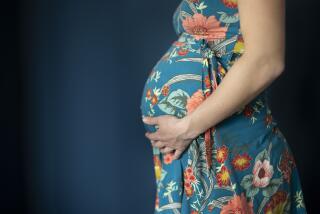Caring, and eating, for two
- Share via
Your article “Living For Two” [Nov. 12] was good, though a bit misdirected. It is true that fetuses are under the influence of much of what the mother ingests, inhales, and maybe even feels because of the release of certain hormones in times of passion, fright, panic. Anything that gets into her bloodstream gets to the baby also.
However, everyone seems to have forgotten one of the most important influences the mother and the environment have on the fetus and, therefore, the child, and eventually the adult. The human immune system gets some of its tags, probably many, directly from the mother.
If the mother in your story, in trying to protect her fetus from “she doesn’t know what,” also kept the fetus from developing its own immune system to ward off everyday assaults, this translates into a child and an adult with a less than fully functional immune system.
The person might be able to make this up in time, but that seems to be not always true -- witness the large numbers of allergies present-day children have compared with earlier generations, whose mothers were not so intent on sterilizing everything so that we did play, at times, in the mud and dirt. We were being exposed to allergens, bacteria and viruses, and our bodies learned to cope.
Ellis Glazier
La Paz, Mexico
--
I have always been a healthy and disciplined eater, but this all went out the window when I got pregnant. I had no control over what I could and could not eat. For a few weeks, the only thing I could stomach was rice porridge with soy sauce and ginger, dry toast or saltine crackers.
I normally love fruits and vegetables, but I could not even look at them. There were many days that I could not even take my prenatal vitamins because they would just come right back up.
During the second trimester, I could eat more variety, but something I ate and quite enjoyed today would be completely vile to me tomorrow. The day I gave birth to my daughter (in August), I went back to my old self. I can again say “no” to French fries and ice cream, and “yes” to fruits and vegetables.
Of course, I wanted to do the very best for my baby, but I had to eat what I could keep down. I know it’s not the same for every woman, but I believe there are many who are powerless to make the “right” food choices during pregnancy. In the end, I consoled myself with the belief that my baby and body knew what it needed.
I sure hope that I haven’t set up my daughter for bad eating habits, but I think that how I raise her to eat has to be more important than what I ate while pregnant.
Christine Okamoto
Irvine
--
Thank you for mentioning diethylstilbestrol -- DES. That medical tragedy seems to be nearly forgotten, yet millions of Americans live with the consequences of their fetal exposure.
Many doctors dismiss it as not a problem any more. Yet those of us who were exposed before birth feel that infertility, the threat of reproductive cancers and the growing fear that it might not end with this generation are not to be taken lightly.
Fran Howell
Columbus, Ohio
The writer is executive director of DES Action.

